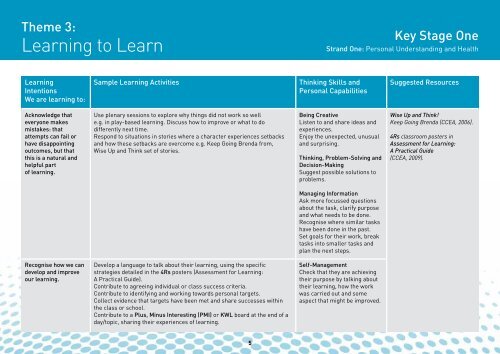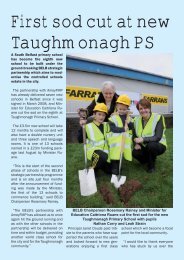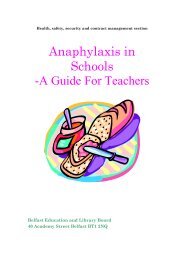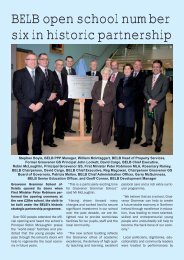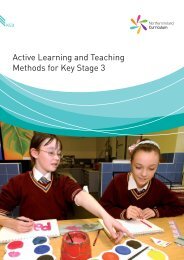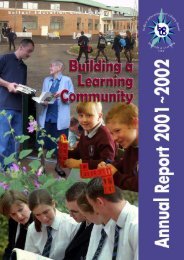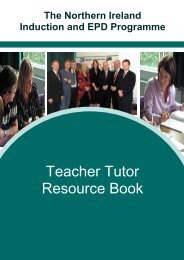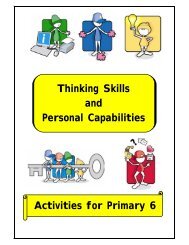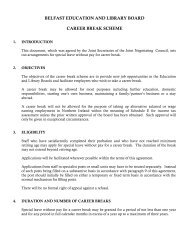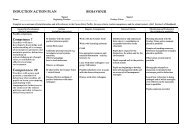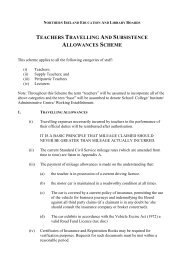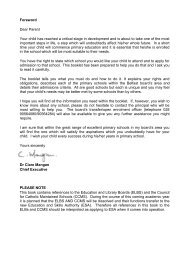Progression in Personal Development and Mutual Understanding
Progression in Personal Development and Mutual Understanding
Progression in Personal Development and Mutual Understanding
You also want an ePaper? Increase the reach of your titles
YUMPU automatically turns print PDFs into web optimized ePapers that Google loves.
Theme 3:Learn<strong>in</strong>g to LearnKey Stage OneStr<strong>and</strong> One: <strong>Personal</strong> Underst<strong>and</strong><strong>in</strong>g <strong>and</strong> HealthLearn<strong>in</strong>gIntentionsWe are learn<strong>in</strong>g to:Sample Learn<strong>in</strong>g ActivitiesTh<strong>in</strong>k<strong>in</strong>g Skills <strong>and</strong><strong>Personal</strong> CapabilitiesSuggested ResourcesAcknowledge thateveryone makesmistakes: thatattempts can fail orhave disappo<strong>in</strong>t<strong>in</strong>goutcomes, but thatthis is a natural <strong>and</strong>helpful partof learn<strong>in</strong>g.Use plenary sessions to explore why th<strong>in</strong>gs did not work so welle.g. <strong>in</strong> play-based learn<strong>in</strong>g. Discuss how to improve or what to dodifferently next time.Respond to situations <strong>in</strong> stories where a character experiences setbacks<strong>and</strong> how these setbacks are overcome e.g. Keep Go<strong>in</strong>g Brenda from,Wise Up <strong>and</strong> Th<strong>in</strong>k set of stories.Be<strong>in</strong>g CreativeListen to <strong>and</strong> share ideas <strong>and</strong>experiences.Enjoy the unexpected, unusual<strong>and</strong> surpris<strong>in</strong>g.Th<strong>in</strong>k<strong>in</strong>g, Problem-Solv<strong>in</strong>g <strong>and</strong>Decision-Mak<strong>in</strong>gSuggest possible solutions toproblems.Wise Up <strong>and</strong> Th<strong>in</strong>k!Keep Go<strong>in</strong>g Brenda (CCEA, 2006).4Rs classroom posters <strong>in</strong>Assessment for Learn<strong>in</strong>g:A Practical Guide(CCEA, 2009).Manag<strong>in</strong>g InformationAsk more focussed questionsabout the task, clarify purpose<strong>and</strong> what needs to be done.Recognise where similar taskshave been done <strong>in</strong> the past.Set goals for their work, breaktasks <strong>in</strong>to smaller tasks <strong>and</strong>plan the next steps.Recognise how we c<strong>and</strong>evelop <strong>and</strong> improveour learn<strong>in</strong>g.Develop a language to talk about their learn<strong>in</strong>g, us<strong>in</strong>g the specificstrategies detailed <strong>in</strong> the 4Rs posters (Assessment for Learn<strong>in</strong>g:A Practical Guide).Contribute to agree<strong>in</strong>g <strong>in</strong>dividual or class success criteria.Contribute to identify<strong>in</strong>g <strong>and</strong> work<strong>in</strong>g towards personal targets.Collect evidence that targets have been met <strong>and</strong> share successes with<strong>in</strong>the class or school.Contribute to a Plus, M<strong>in</strong>us Interest<strong>in</strong>g (PMI) or KWL board at the end of aday/topic, shar<strong>in</strong>g their experiences of learn<strong>in</strong>g.Self-ManagementCheck that they are achiev<strong>in</strong>gtheir purpose by talk<strong>in</strong>g abouttheir learn<strong>in</strong>g, how the workwas carried out <strong>and</strong> someaspect that might be improved.5


